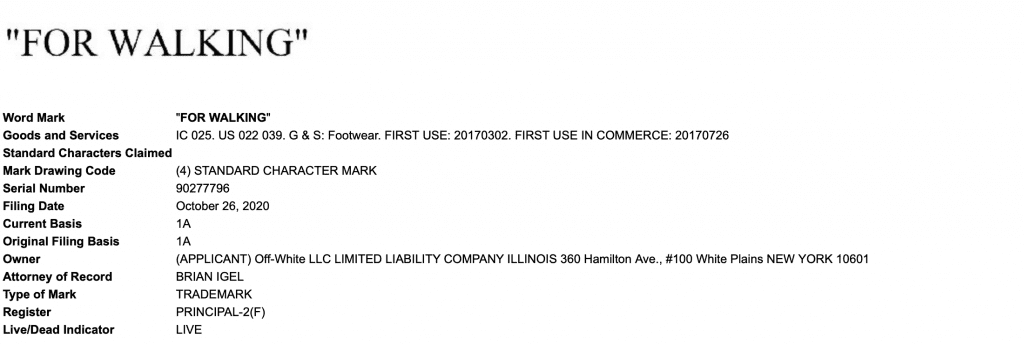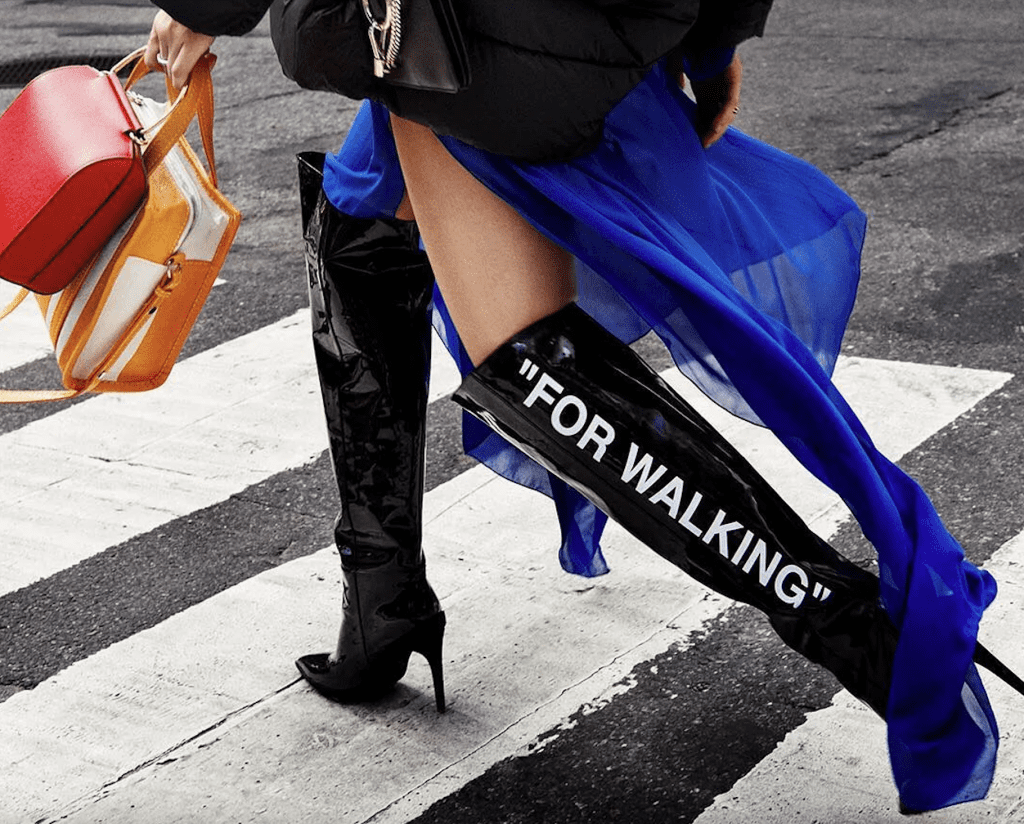An examining attorney for the U.S. Patent and Trademark Office (“USPTO”) failed to consider the impact of the inclusion of quotation marks when she refused to register one of Off-White’s trademarks, the brand argues in a new filing. In response to the latest in a string of refusals issued by a USPTO examiner in September, counsel for Off-White argues that the examining attorney got it wrong in determining that Off-White’s “FOR WALKING” mark fails to function as a trademark for “footwear” specifically because it is more likely to be perceived by consumers as “conveying information” about Off-White’s goods than acting as an indicator of their source.
In the newly filed response, Off-White claims that despite USPTO examiner Shaunia Carlyle’s claims to the contrary, its “FOR WALKING” mark – which it filed an application for back in October 2020 – serves a “source-identifying function due to at least the unique commercial impression created by [Off-White’s] distinct use of quotation marks around the phrase.” As such, counsel for the brand “requests that the failure to function refusal be withdrawn and the application published for opposition.”
Delving into what, exactly, Carlyle got wrong when she withdrew the application from publication on the basis that it does not “function as a trademark,” counsel for Off-White asserts that the evidence she cites does not establish that the mark is entirely informational, in large part because the cited examples consist of use of the words “for walking” – namely, by fashion websites like Elle and Who What Wear – in connection with footwear, but without the quotation marks. The quotation marks are “part of [Off-White’s] mark as a whole, are highly relevant to the perception and commercial impression of [the] Mark, and must be considered in the analysis of how relevant consumers will perceive the [mark],” Off-White’s counsel asserts.
Courts “explicitly acknowledge that punctuation, including quotation marks, can change the commercial impression of a mark,” Off-White states, arguing that “the use of written quotation marks is a widely understood and recognized grammatical device for indicating irony and sarcasm, much like air quotes used in verbal communication.” Against that background, Off-White claims that by including quotation marks, the “FOR WALKING” mark “requires a consumer to use imagination, thought, or perception to reach a conclusion as to the nature of [Off-White’s] footwear because [the] mark signals irony.”

Citing media accounts, including one from NME that states that “when you see quotation marks on an item of clothing – such as “FOR WALKING” on a pair of boots – you instantly knew it was Abloh’s work, since it sarcastically announced what the item was,” Off-White argues that the “tongue-in-cheek contradiction between utility and purpose created by the mark and [its] use of quotation marks has been explicitly recognized by the relevant public.”
Off-White goes on to highlight “over a dozen” other media accounts that link the use of quotation marks to Off-White as evidence of the fact that “for over five years, the fashion industry and media have consistently recognized [its] use of quotation marks as identifying the source of [its] goods” – and not merely “conveying information about” Off-White’s products.
(If this argument sounds familiar, it is because Off-White’s counsel raised similar points in earlier responses, arguing last year that its mark is different from “mere use of the word or phrase without the quotation marks,” as the inclusion of the quotation marks causes the trademark to acts as a “double entendre.” The examining attorney has been largely unpersuaded by such assertions, stating in an Office Action in July 2021, for example, that generally, “adding punctuation marks to a descriptive term will not ordinarily change the term into a non-descriptive one,” and specifically, “here, with and without the quotation marks, the mark implies a feature of the goods – desirable and made FOR WALKING.”)
“Based on at least the foregoing,” Off-White contends that “FOR WALKING” functions as a trademark to indicate the source of its goods, and “to identify and distinguish itself from others,” and thus, “respectfully requests that the refusal be withdrawn.”
Maybe more interesting than the fight over the “FOR WALKING” mark is the underlying case that Off-White appears to be making that it has sweeping rights in its use of quotation marks regardless of what words appear in between them. After all, the arguments that Off-White makes here (and in previously responses) and the evidence of media attention that it cites tends to center on the use of quotes broadly, as opposed to individual marks (such as “FOR WALKING” or “PRODUCT BAG”).
As for whether Off-White would ever be able to register its use of quotation marks with some placeholder for holders in between for use on footwear, clothing, etc., we dove into some of the issues with that, including the likelihood that such a mark would be deemed a phantom mark and thus, not registrable, here.











